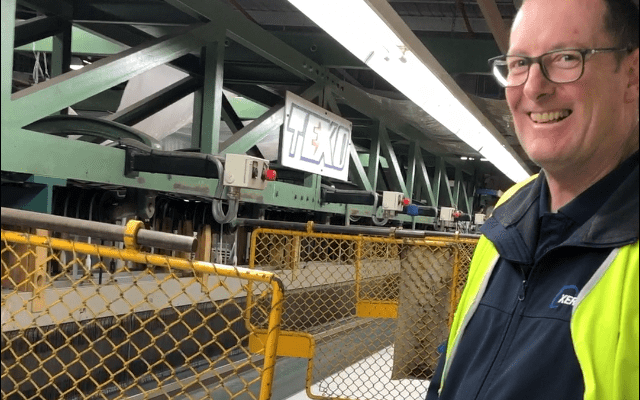Cluster member Andritz Fabrics and Rolls has experienced a significant jump in revenues and earnings this year as demand for the products its customers supply to retailers suddenly escalated with the onset of the COVID-19 pandemic.
Andritz is a full-line supplier of paper machine “clothing” and roll service for the global pulp and paper industry as well as other process sectors.
Mikel Dean, managing director at the Breakwater, Geelong-based business, tells the Cluster that revenues shot up by a quarter and earnings jumped 35% this year as orders were brought forward, propelled by demand in the retail space.
“Our customer base has had huge growth which means we have tailed on the end of that. We’ve had massive growth from COVID, we are one of the lucky businesses as we have benefited.’
– Mikel Dean, Managing Director at Breakwater
“There was a lot of panic in the hygiene area around the world when COVID came on board. We have actually grown and put people on through COVID because our customers make hygiene products: toilet paper, tissue, hand towel and all the packaging.”
Turnover is around $60 million a year and the firm employs 100 staff in Geelong, and about 100 agents throughout Asia, serving the overseas wholesale clients which take 98% of Andritz product.
Andritz Fabrics and Rolls is part of ANDRITZ Group, an industrial processing business founded in 1852 and now listed on the Austrian stock Exchange. Annual revenues exceed 5 billion euros.
“Our little business down here is a pebble in their business. We’re a pretty small part of it but we’re making a big return,” Mr Dean says.
“The pulp and paper area that we’re in has definitely had a lot of growth and is generating a lot of cash for the business. Other sectors have suffered — certain sectors they are in have taken a huge hit.”
Mr Dean has turned the company from being a loss-maker to a successful global exporter and the new benchmark for innovative fabrics, felts, rolls technology and services, integrating the former Xerium brands of Huyck Wangner, Weavexx, Stowe Woodward, Xibe/Stowe, Mount Hope, Robec, IRGA, JJ Plank and Spencer Johnston.
Andritz offers customised equipment used in papermaking processes. Mr Dean says the manufacturing facility was always viable but needed big changes in how it was run and the introduction of fresh talent.
“We got middle management in and modified the process of how they did things, really just re-engineered the whole way we do business,” he says.
“We had to make some significant people changes. My analogy is that there wasn’t low hanging fruit–the fruit was already on the ground. There were so many easy things that could be done that people didn’t pick up and want to move forward. We moved along and got people that wanted to move in that direction.”
– Mikel Dean, Managing Director at Breakwater
New pipelines within the offering were also introduced and the team scaled up the factory.
“Obviously economies of scale make a big difference when you’re trying to lower overall manufacturing costs. There was demand in the market, we couldn’t even meet the demand at the time. There were so many things that made it line up that it was really a matter of having a plan visible and getting the right people in place to execute,” Mr Dean explains.
Business is still strong at the moment, he says, and “there is definitely still some growth to occur.”
Paper Machine Clothing is a water filtration device for the papermaking industry and serves Andritz customers, which make cardboard for packaging or tissue, hand towel, and so on. Andritz aids in a dewatering process, taking the ratio of 95% water and 5% pulp or fibre to 5% water and 95% pulp.
Next year Mr Dean forecasts a “stabilising” of his market.
“We’re not going to see the same numbers next year, we’re looking for a modest year,” he says, projecting 3-4% revenue growth. He is hopeful the government will reassess Australia’s supply chain in the light of COVID and says the biggest challenge Australia faces is scale.
“We are a small country. We don’t have a big population and the market is not huge and we are a long way from where our customers are,” Mr Dean says. “So it is tough in Australia but there are definitely opportunities.”
Mr Dean, a self-declared “region person” who prefers to avoid capital cities and lives in a town of 1,200 outside Geelong where “small is good,” applauds the AFCG.
“The value is the networking,” he says. “It is a great idea and I support it 100%.”
Nov 2020
